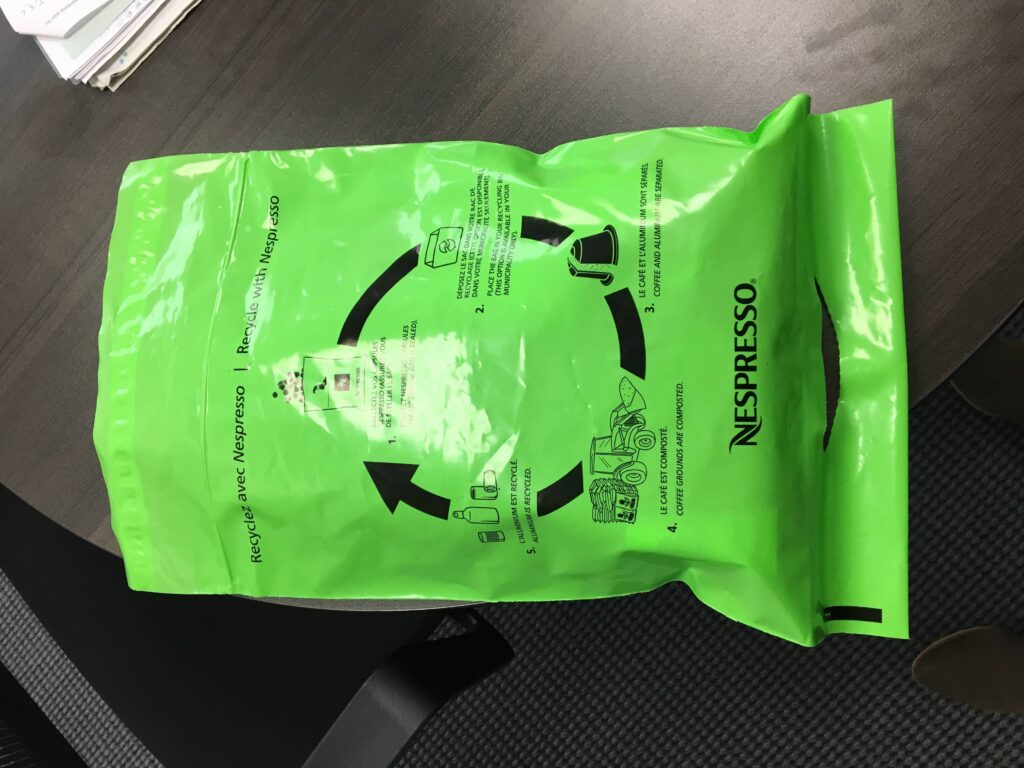Update: November 2, 2020: The Nespresso Green bag pilot project has concluded. Nespresso is pleased to announce that the mail-in red bag recycling solution will be distributed to Club Members that previously received green recycling (curbside) bags in British Columbia (Coquitlam, Anmore, and Vancouver residents only).
Nespresso Club Members in these communities can collect their used Nespresso capsules, ensure the red bag is sealed, and drop the postage-prepaid red bag off at a Canada Post mailbox or Post Office. The bag is then delivered to a recycling facility where the coffee grounds are separated from the aluminum. They are then composted, and the aluminum recycled.
All Club Members also have access to the black bag recycling solution, allowing them to drop off used Nespresso capsules in boutiques or with participating retail partners.
For more information, residents can contact the Nespresso Club at 1-855-325-5781.
March 18, 2018: Starting today, used Nespresso coffee capsules can be recycled in the City of Vancouver through curbside collection via the latest phase of the Green Bag recycling pilot project. Nespresso, in partnership with Recycle BC, have launched the Green Bag pilot project to make it easier for people to recycle. This is the second phase of the pilot project, following its implementation in Coquitlam and Anmore in May 2017.
“We understand how important it is to reduce our environmental footprint and we continue to take an active stance in developing recycling solutions,” says Jean-Luc Valleix, Nespresso Canada President. “We are particularly proud to launch this innovative pilot project along with our local partner, Recycle BC.”
“As the only program in North America that is financed by the companies that produce packaging and paper products to operate the recycling system from collection through to processing the materials, we have a unique opportunity to collaborate with companies like Nespresso,” says Allen Langdon, Recycle BC Managing Director. “Through these partnerships, we can make recycling easier for residents, ensuring more material is recycled and less goes towards landfill.”
All residents of the City of Vancouver will have access to the Green Bag pilot project that makes recycling coffee capsules as easy as taking out the recycling. This represents a significant change for Nespresso customers who will now be able to recycle from the comfort of their homes. A recent study Nespresso conducted with Leger found that 97 per cent of BCers recycle always or often.
“We know our customers want to recycle their coffee capsules, it’s what they do every day with all of their other recyclable items. They just need to be given a simple way to do it and that’s what we’re launching today,” adds Valleix.
This solution, tailored to local realities, builds on other well-established measures and aims to increase the collection capacity of the used 100 per cent recyclable Nespresso capsules. Based on the success of this pilot project, Nespresso and Recycle BC hope to expand it across British Columbia within the next year. Nespresso’s global goal is to offer 100 per cent of its customers a recycling solution and, consequently, to significantly increase the recycling rate by 2020.
It’s in the bag!
City of Vancouver residents simply put their used capsules in a 100 per cent recyclable Green Bag provided at no extra cost by Nespresso Canada when coffee capsules are purchased. They then place the sealed capsule-filled bag in their household’s recycling bin.
Only system of its kind in Canada
Once collected by Recycle BC, the capsules are shipped to a partner where they undergo a technological process, the first of its kind in Canada, which mechanically separates the coffee grounds from the aluminum. The aluminum is repurposed and the coffee grounds are transformed into a high-quality compost, used by farms, at no additional cost to citizens or municipalities.
Local actions, global commitment
This initiative is part of the global Nespresso program, The Positive Cup, which focuses on three areas, namely providing 100 per cent sustainably sourced coffee, making use of 100 per cent responsibly managed aluminum and achieving its goal of a 100 percent carbon neutral footprint by 2020.
Research Methodology
From August 14 to August 21, 2017, an online survey was conducted among 1,568 randomly selected Canadian adults who are Leger panelists. The margin of error—which measures sampling variability—is +/- 2.5%, 19 times out of 20. The results have been statistically weighted according to region (and in Quebec language), gender, age, income, and education from Statistics Canada data to ensure a sample representative of the entire adult population of Canada. Discrepancies in or between totals are due to rounding.


